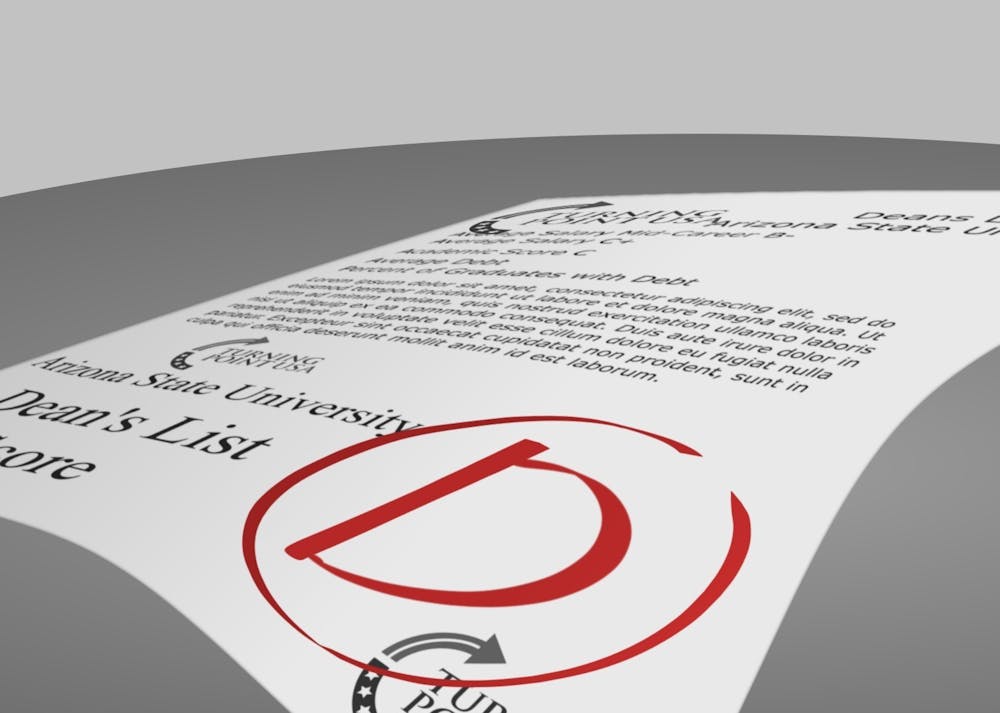Last week, Turning Point USA unveiled its college ranking system called "Dean's List." This list is based on only the most traditional hallmarks of a good university; TP USA says it was based on "(presence of) woke activist culture, racial discrimination, and hostility toward conservative students."
And I should note, the "racial discrimination" they're talking about is toward white students. A University that receives an A on this list would be considered "the ideal free speech paradise" by the conservative organization. One that receives an F, however, might as well be openly communist.
On a slightly more serious note, I think this list is incredibly helpful for the University as it points out exactly where we need to improve. I say the University should aim for an F — the lower, the better.
ASU originally received a C- according to these standards, but the grade dropped to a D. I say, if the University wants to truly support its students and rise to the level of other academic institutions, we should aim low on the Turning Point scale.
The site gives institutions overall grades as well as grades in individual categories. These categories range from things such as the average salary of recent graduates and the average amount of student debt all the way to things such as whether there is mandated diversity, equity and inclusion training and in-state tuition for undocumented students in Arizona.
According to the website, the University received two As: one for having a TPUSA chapter and one for not having a bias response team. Two of the lower, more "liberal" rankings were an F for having mandated diversity, equity and inclusion training for staff and a D for having the same training be required for students — oh, the humanity.
READ MORE: Barrett faculty petitions, condemns event featuring Dennis Prager and Charlie Kirk
Anywhere the University got good marks should be seen as a potential area for improvement. For example, an area for improvement would be the University's harassment policy.
The University defines harassment as "a specific form of discrimination. It is unwelcome behavior, based on a protected status, which is sufficiently severe or pervasive as to create an intimidating, hostile, or offensive environment for academic pursuits, employment, or participation in university-sponsored programs or activities."
According to the Dean's List, the University received a B rating for its harassment policy because "it does not reach the strict standard of many other universities." Turning Point, of course, sees this as a good thing; after all, what's more patriotic than allowing harassment? I, however, don't.
To that, I ask, why doesn't it meet the standard of other universities? What is the University not doing that makes its harassment policy fall below the standard of other colleges?
The University of California, Riverside received a D for its harassment policy and an F overall. According to its website, UC Riverside defines harassment as "conduct that is so severe and/or pervasive, and objectively offensive, and that so substantially impairs a person's access to University programs or activities that the person is effectively denied equal access to the University's resources and opportunities."
UC Riverside also distinguishes between several categories of harassment such as "conduct that is motivated on the basis of a person's race, color, national or ethnic origin, citizenship, sex, religion, age, sexual orientation, gender identify, pregnancy, marital status, ancestry, service in the uniformed services, physical or mental disability, medical condition, or perceived membership in any of these classifications."
Compared to ASU's harassment policy, this is much more defined and clear when it comes to what counts as harassment and what doesn't. Harassment thrives best in gray areas and vague definitions.
This is clearly somewhere the University could improve, and it would not be hard to do so. A little more specificity could help get the policy to the standards of other universities.
Another area in which the University could improve is adopting a bias response team.
Currently, the University has no specific bias response team in place; instead, the University directs students to file reports with the Office of Student Rights and Responsibilities.
According to the Dean's List, ASU received an A for its lack of a specific bias response team. Again, unsurprising; what's more quintessentially American than having no dedicated force that takes initiative to help someone who has experienced something traumatic like harassment?
Compare this to UA, which received an F overall and an F for its adoption of a bias response team that specifically handles cases of potential harassment and discrimination against students.
According to its website, UA's bias response team, BEST, "provide(s) care and support to impacted individuals," while also sending information that students provide in reports to the appropriate offices so that the cases can be handled.
Compared to the University's lack of a bias response team, this seems much better. Victims of harassment and discrimination can have some support from the school while the response process occurs instead of waiting for their case to be heard out by the school with zero support leading up to it.
These were just two among many other examples contained in the Dean's List of areas in which the University can improve. Call me a communist or a "cultural Marxist;" a D is good, but it needs to be an F.
Edited by Kate Duffy, Reagan Priest, Piper Hansen, Greta Forslund and Luke Chatham.
Reach the columnist at swmcgee@asu.edu and follow @swmcgeemedia on Twitter.
Editor's note: The opinions presented in this column are the author's and do not imply any endorsement from The State Press or its editors.
Want to join the conversation? Send an email to opiniondesk.statepress@gmail.com. Keep letters under 500 words and be sure to include your university affiliation. Anonymity will not be granted.
Like The State Press on Facebook and follow @statepress on Twitter.




